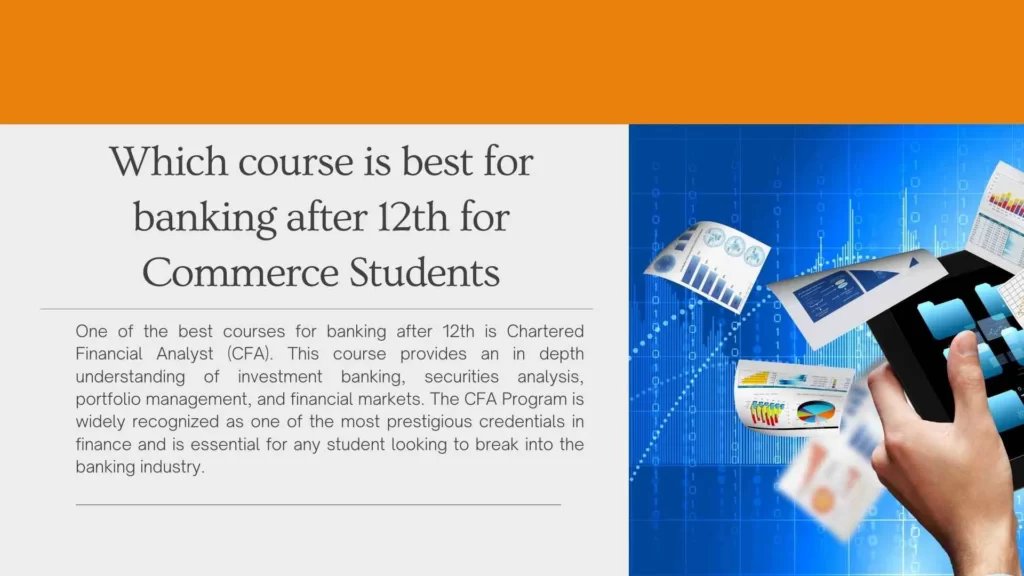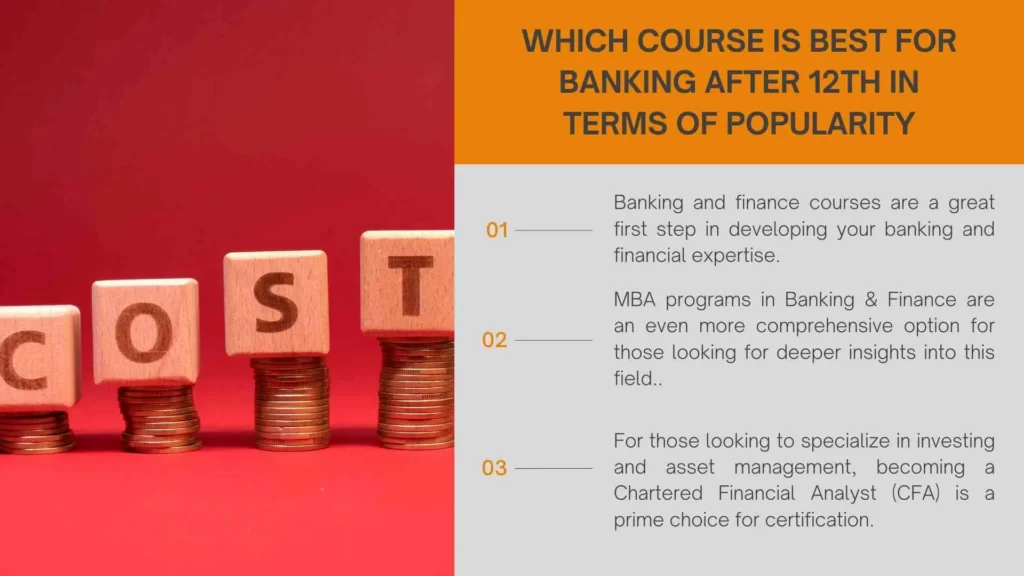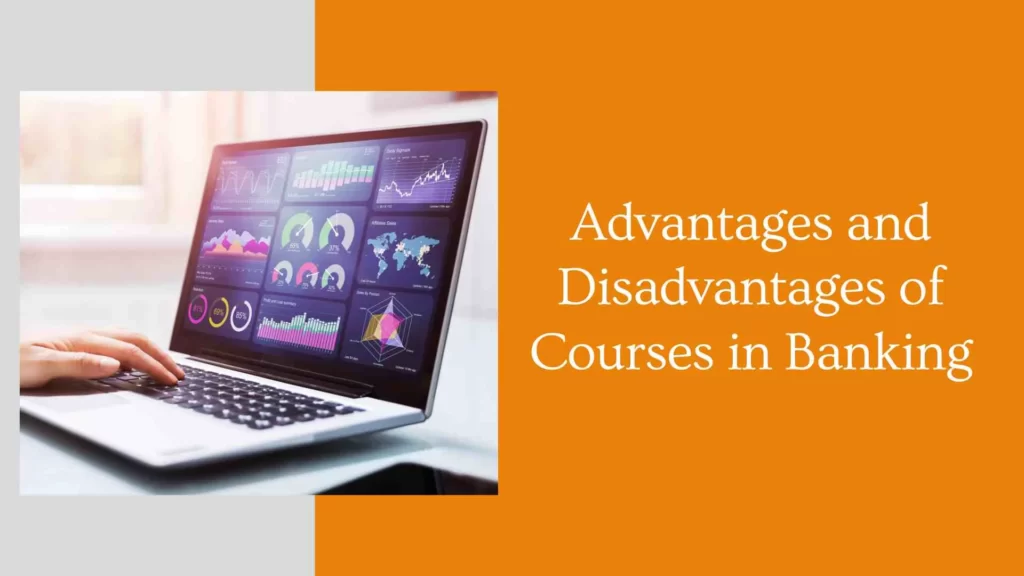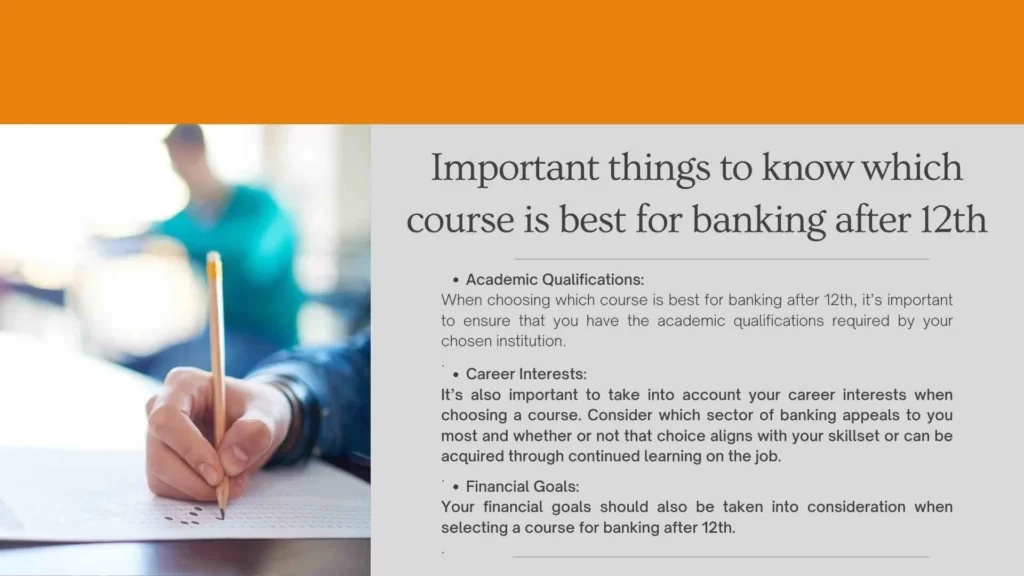Introduction
With the banking sector being so competitive, it’s important to look for courses that can give you an edge. Which course is best for banking after 12th depends upon various factors. In this blog, we will discuss which course is best for banking after 12th. Let’s take a closer look at the qualifications you need, the subjects of study that banking professionals must focus on, and what career options are available.
To know Which course is best for banking after 12th let’s start with the banking sector. The banking sector is full of opportunities for those who are qualified and have expertise in specific areas. To get started with your chosen course, you’ll need to have cleared Class 12th examinations with good marks in relevant subjects. Depending on the bank and position you hope to secure, required subjects can vary quite a bit. In general, though, mathematics is often seen as essential in terms of banking success.
Along with this, there may be other subject specializations that could be beneficial. These could include economics or business management theory or even accounting and finance courses. So to answer this question on which course is best for banking after 12th becomes crucial.
Course selection should be based on your study interests as well as desired job requirements. It’s also worth considering if furthering studies by taking Postgraduate diploma courses would make sense for you or if Bachelor’s degree programs are more appropriate for your goals.
What’s important is finding Which course is best for banking after 12th is the right balance between personal interests and benefits for your future job prospects. In terms of specializations within bank-related jobs, there are some typical ones such as financial services management or retail banking operations that can help focus your studies and exploration of job roles within this sector.
There are also other fields such as investment banking or risk management which require specialized skills too and provide unique paths towards working in this often challenging but ultimately rewarding industry.
Which course is best for banking after 12th

If you’re thinking about which course is best for banking after 12th in banking, it can be confusing to decide which course is best for you. There are several specialized banking courses and degrees available, so it’s important to understand the different options and their benefits in order to determine which course is best for banking after 12th.
A great way to enter the world of banking is by pursuing a Bachelor’s degree in finance. This will provide an excellent foundation of knowledge that can be used both practically and theoretically when dealing with different scenarios within the industry.
During your studies, you’ll learn about topics such as money management, corporate finance, marketing strategy, financial analysis and more all skills that are vital for success in the industry. For furthering your career prospects, a Master’s degree in business or finance may also be beneficial and you will be able to confirm as to which course is best for banking after 12th
In addition to traditional academic qualifications, there are also many professional certifications and diplomas available which specialize in core banking skills. These can often be completed alongside a degree or as individual programs depending on your career goals.
For example, if you want to work as a banker or financial advisor, then qualifying for certificates like Certified Financial Planner (CFP) or Certified Investment Banker (CIB) can help you stand out amongst other candidates when applying for roles within the sector.
For knowing which course is best for banking after 12th It’s important to consider what kind of knowledge base is necessary for achieving success within the banking sector before choosing any particular course or qualification. Whilst academic qualifications provide an essential theoretical basis for understanding various concepts related to finance and economics, practical experience is also key particularly when it comes to client interaction and providing advice on complex financial matters.
A proper informed decision will then only help you to ensure which course is best for banking after 12th for yourself.
Which course is best for banking after 12th for Commerce Students

If you are a Commerce student looking for a banking course after 12th, you may be wondering which course is best for banking after 12th for you. There are several options available and it can be difficult to decide which course is best for banking after 12th to succeed in your banking career. Fortunately, there are several courses that are specifically designed to give students the knowledge and skills needed for success in the banking industry.
One of the best courses for banking after 12th is Chartered Financial Analyst (CFA). This course provides an in depth understanding of investment banking, securities analysis, portfolio management, and financial markets. The CFA Program is widely recognized as one of the most prestigious credentials in finance and is essential for any student looking to break into the banking industry.
Another great course after 12th commerce is an MBA in Banking. This course gives students a comprehensive understanding of financial instruments and strategies used by banks and other financial institutions. It covers topics such as risk management, credit analysis, capital structure theory and portfolio management among other areas integral to operating a successful bank.
An MBA in Banking prepares students for senior positions in their profession by providing them with advanced knowledge and analytical skills needed to make sound decisions about borrowing, lending, investing and managing money on behalf of customers.
Finally, another popular choice amongst students looking for courses after 12th commerce is certification courses from the Indian Institute of Banking & Finance (IIBF). These courses provide comprehensive knowledge about banking operations along with practical advice on how to excel at various aspects of banking such as customer service, fraud detection and security measures. IIBF-certified courses also offer insights into corporate governance principles that are essential to the functioning of banks today.
Have a look at the best PG Program In Investment Banking with PLACEMENT GUARANTEE
Which course is best for banking after 12th for Arts Students

Are you an Arts student looking for which course is best for banking after 12th ? With many options available, it is difficult to decide which course is the best for you. Here, we will dive into the details of the various courses available and discuss which course is best for banking after 12th for the Arts stream.
The first option is BBA (Bachelor of Business Administration). This course provides an overview of the business world, covering topics such as economics, finance, accounting, marketing, etc. This course also offers internships and placement opportunities that are essential for any banking professional. Additionally, you will gain expertise in management skills and teambuilding activities that will further enhance your career prospects.
If you are considering a more specialized degree in banking after 12th then you can opt for a Bachelor’s degree in Banking & Finance or Computer Sciences. These degrees provide intricate knowledge about the functioning and dynamics of the banking industry as well as an in-depth understanding about financial analysis techniques used by banks and other related institutions. Both these courses offer specialization in areas such as international finance, risk management and insurance policies which are essential skills required by those working in banks.
The third option is to opt for a Master’s degree after completing your Bachelor’s program. There are various MBA programs available with specialized majors such as Finance or Banking which would provide you with added expertise to help you develop your career pathway within the banking industry. These courses also focus on core subject areas such as investment analysis and investment banking which would be immensely useful once employed by a bank.
In conclusion, there are different levels of courses available for Arts students who wish to pursue a career within banking. Banking does not necessarily means only commerce students. Even students from the other streams can look forward to a career in the banking industry.
Which course is best for banking after 12th for Science Students
If you are a science student who is considering appearing for banking exams after you have completed your 12th grade, you may be wondering which course is best for banking after 12th. There are a few options that could work for you depending on your skills and abilities.
The most commonly pursued route to enter the banking sector is through a Bachelor’s degree related to economics or finance. This way, you will gain the necessary knowledge and skills in order to compete in the banking industry and qualify for higher-level positions. Choosing an accredited university that offers this degree program will ensure that your qualifications are recognized by the banking institutions.
Apart from pursuing a Bachelor’s degree, their other courses that can give you an edge when it comes to the banking sector. A postgraduate degree in business, finance or economics can be beneficial if you are willing to undergo further study after completing your 12th grade studies.
You can also look at taking up professional courses such as )CFA (Chartered Financial Analyst, CAIA (Chartered Alternative Investment Analyst), ACCA (Association of Chartered Certified Accountants), FRM (Financial Risk Manager) and CFP (Certified Financial Planner). These courses can help to build your confidence when it comes to financial management and provide the necessary insight into modern-day banking practices.
In addition to pursuing higher education, there are other pathways available for those who want to enter the banking industry without attending university first. An apprenticeship program with a bank or financial institution can help you learn about the industry from experienced professionals in real-time scenarios and qualify for jobs faster than those who pursue only theoretical knowledge without practical experience. I hope this answers your question on” which course is best for banking after 12th for Science Students”
Which course is best for banking after 12th in terms of popularity

Are you wondering which course is best for banking after 12th? Many students are combining their passion for finance and banking with a top-notch education to build successful careers. Depending on your career goals, there are plenty of popular courses to choose from that can help you reach your desired outcome.
- Banking and finance courses are a great first step in developing your banking and financial expertise. From understanding the fundamentals of investment banking to delving into the complexity and risk management of today’s volatile market, these courses offer valuable knowledge that can be applied in any financial setting.
- MBA programs in Banking & Finance are an even more comprehensive option for those looking for deeper insights into this field. From cash flow analysis to market volatility modeling, these programs provide a diverse range of topics that explore all aspects of banking and finance.
- For those looking to specialize in investing and asset management, becoming a Chartered Financial Analyst (CFA) is a prime choice for certification. This designation will give you the skills necessary to analyze investments, asses risk, and make informed decisions on the types of investments that will yield the best returns for your clients.
- If you’re interested in providing reliable financial advice and guidance to individuals throughout their life spans, then becoming a Certified Financial Planner (CFP) might be the right choice. These professionals help clients create budget plans and investment portfolios that match their short term goals as well as long term objectives.
Finally, if you’re eager to pursue a career in investment banking, then there is an array of specialized courses available that teach everything from capital markets and equity analysis to mergers & acquisitions processes and portfolio management.
Advantages and Disadvantages of Courses in Banking

If you’re looking which course is best for banking after 12th, you may want to consider taking courses that focus on specific aspects of the industry. Courses in banking provide comprehensive knowledge and skills to equip you with the necessary tools to pursue and develop a successful banking career. Though there are several advantages and disadvantages to undertaking such courses, they all offer increased earning potential and improved job prospects.
which course is best for banking after 12th in terms of its advantages?
The most common courses in the field of banking are Finance & Accounting, Risk Management & Compliance, and Business Law. All of these courses focus on understanding currency exchange rates, financial markets, corporate finance rules, commercial and consumer credit practices, etc., which are essential for success in the banking industry. They also cover topics such as enterprise risk management systems, capital adequacy requirements, customer service procedures, etc., thus ensuring that graduates are well-prepared for entry-level positions at banks.
However, it is important to note that pursuing courses in banking can be costly due to the tuition fees and additional course materials needed for successful completion. Also, the duration of such courses can often be long (usually 24 years) depending on your chosen program and institution. Moreover, though these courses equip students with valuable qualifications and experience in their desired field of work more mobility may be limited since most positions require further specialized training or experience.
All in all, though taking courses in banking comes with its own set of advantages as well as disadvantages; it’s ultimately up to you whether which course is best for banking after 12th and whether will it benefit your future endeavours or not. Weigh out all the standard costs involved against its potential returns before taking any major decisions concerning your future career path!
Important things to know which course is best for banking after 12th

You’ll need to consider a number of different factors before selecting the right course for you. With the variety of courses available, it can be challenging to narrow down your choices. To help you make the best decision for your on which course is best for banking after 12th for your future, here are some of the key factors to consider when picking a course for banking after 12th:
Academic Qualifications
When choosing which course is best for banking after 12th, it’s important to ensure that you have the academic qualifications required by your chosen institution. This will give you insight into whether or not your knowledge and skillset are up to date and suited for the course. Additionally, many institutions will require specific prerequisites such as an aptitude test or a level of mathematics ability.
Career Interests
It’s also important to take into account your career interests when choosing a course. Consider which sector of banking appeals to you most and whether or not that choice aligns with your skillset or can be acquired through continued learning on the job. You should also research any potential prospects in each sector such as salary packages, job opportunities etc. so that you can make an informed decision about which path is best for you.
Financial Goals
Your financial goals should also be taken into consideration when selecting a course for banking after 12th. Consider any scholarships or bursaries available at certain institutions as well as job prospects available upon completion of the course. This will provide insight into any potential income streams post course and whether it aligns with your long term financial goals.
Tips on Getting Into the Right Course for You
Finding the right course for you can be overwhelming with so many options out there. But don’t worry you can narrow things down and make an informed decision by taking a few key steps.
When searching for which course is best for banking after 12th, research is essential. Find out what education requirements are needed in the field and then identify your interests and skills. This will help you narrow down potential options that fit your needs. After that, it’s important to assess your career goals so you can make sure the course you choose aligns with those plans.
In addition to researching courses, consider looking up job opportunities in the banking field to get an idea of what types of positions are available to ensure successful post-graduation employment prospects. You also should look into scholarships and financial aid options as these could potentially help reduce the costs of tuition as well as compare schools and specializations to find the best fit for your budget and needs.
Finally, don’t forget to evaluate student experience when selecting a course. Look at student reviews online or inquire within your network. Finding out what life is like in a program firsthand will give you a real insight into whether it could be the right choice for you.
By following these steps on how to decide which course is best for banking after 12th, you’ll be able to make an informed decision on which path suits your needs best going forward!
Conclusion
Deciding which course is best for banking after 12th to study can be overwhelming, especially with all the various banking job roles out there. If you want to get a head start in this competitive field, here’s a review of some of the top courses that could help you get that edge.
The first and most obvious route is to pursue a degree in Banking or Finance. which course is best for banking after 12th, of course, which provides an in-depth understanding of basic financial planning, principles and operations? It also provides the necessary theoretical and practical knowledge needed to work in a bank. Along with teaching core banking concepts, such as accounting, economics and mathematics, these degrees also equip students with soft skills like communication, problem-solving and customer service. A degree in Banking or Finance can be completed within 3-4 years for both undergraduate and postgraduate levels.
In addition to traditional banking degrees, technology has changed many aspects of banking over recent years giving life to emerging job roles such as Fintech Analysts (Financial Technology). Fintech Analysts are highly trained professionals who use software engineering techniques combined with finance skills such as data analysis and risk management to identify opportunities created by financial technologies such as blockchain or Machine Learning techniques.
Frequently Asked Questions
The answer to which course is best for banking after 12th or graduation are as follows
- MSc in Banking and Finance.
- MVoc in Banking, Stocks and Insurance.
- Master in Banking or Finance or Insurance.
- PhD in Banking and Finance.
- Post-Graduate Program in Investment Banking and Capital Marketers.
- BBA and MBA Integrated Course in Banking.
- MA in Banking.
- MBA in Finance.
Following are some suggestions on which course is best for banking after 12th
- Bachelor in Banking and Finance.
- BBA in Banking/Accounting.
- Bachelor in Economics.
- Bachelor in Finance and Accounting.
- Bachelor in Statistics and Business.
- Bachelor in Banking And Insurance (BBI)
- B.Com in banking.
- Bachelor in Commerce.
- Self Study
- Free Mock Test Series with Solutions.
- Previous Year Question Papers PDF with Solutions.
- Bank PO Question Papers with Solutions.
- Daily Current Affairs.
Aspirants from various streams, including Commerce, Business, Arts, and Engineering, seek bank courses after graduation. The same holds good with graduates of B.Com they are the most interested in Bank jobs and always look for Banking Courses after B.Com.
No, MBA degree is not a mandatory requirement for govt jobs in banking sector.
To get a job in Banking, you must have a bachelor’s degree in Commerce or Management. Additionally, you should have knowledge of quantitative aptitude, general awareness, reasoning, English and basic computer skills to do well on bank exams.
The banking sector definitely requires a basic understanding of mathematical concepts but is not at all important to have Maths as a subject in your 10+2 standard.
You can get a bank job after 12th grade by taking the right banking courses and showing that you’re enthusiastic. Bank jobs, including government jobs, are always in demand. Banks look for people who are driven and willing to take on new tasks.
The candidate must be a citizen of India. Age limit: The general age limit to apply for a bank PO exam is between 20 and 30 years. However, different banks avail for different age limit eligibility. For selected categories, age limit relaxations are also provided in terms of bank PO eligibility.
Yes, it will be tough for you if you do not like the preparations and skills that revolve around this program.





